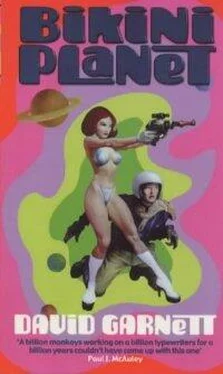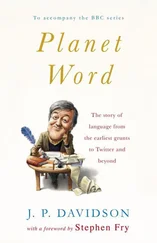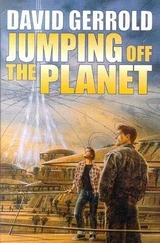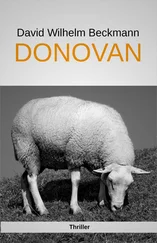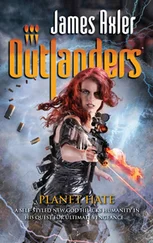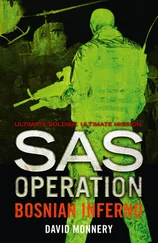“Those who know nothing,” said a girl’s voice, “teach. Those who know less than nothing teach history.”
Norton glanced around and saw the waitress. She’d brought a huge tray laden with food, which she held with one hand. Her other hand twirled her parasol. As she slid the meal onto the table, Norton realised she had been guiding the floating tray with her fingertips.
“Great service here,” said Travis.
“Glad you appreciate it,” said the waitress, then she bent down and kissed him full on the lips.
Great service? So it seemed.
“My darling,” said Travis, “meet John Wayne. John Wayne, this is my daughter.”
Norton glanced from Travis to the waitress. His daughter…?
He started to stand, holding out his right hand to shake hers. As he rose, she leaned toward him, her hand caressing his cheek, then sliding around his neck, stroking the back of his head. She pulled his face to hers, his mouth against her mouth. Her lips parted, and her tongue slipped between his lips and found Norton’s tongue. She kissed him deeply.
For a few seconds, he was too astonished to respond, and then his own lips and tongue started to greet hers—which was when she drew away.
“Very fine,” she said, and she joined them at the table.
“Er… yeah,” said Norton.
He’d never been complimented on his kissing technique before. Everything he knew, he’d learned from Susie.
Susie…
He’d tried to put her out of his mind, but couldn’t. If all historical records had been deleted, then he would never know what had happened to her. He was glad. Norton would never forget Susie, and he could never be tempted to check her biography.
Susie had been his first real girlfriend. Until now, she’d been the only one who had ever kissed him like that.
It seemed that kissing wasn’t what it used to be, because the girl had also kissed Travis.
Her father…?
At least that hadn’t been tongue to tongue.
Travis was looking at Norton. “Verified,” he said, which Norton realised must have been what the girl had really said.
Before Norton had a chance to ask what had been verified, Travis thrust his right hand toward him, and automatically Norton put out his own hand to be shaken. Instead, Travis’s hand gripped Norton’s wrist, and so Norton wrapped his own fingers around Travis’s wrist. Then Travis offered his left hand, and Norton did the same. The two men had their arms crossed, each with both hands gripping the other’s wrists.
“Welcome, brother,” Travis said, as he stared into Norton’s eyes.
“Er… thanks,” Norton muttered. “It’s always good to meet a brother officer.”
“A superior officer,” Travis reminded him, as he released his grip on Norton’s arms.
Travis could have been around fifty years old; the girl was perhaps half that age. He was black; under her spectrum of makeup, she was white.
“I didn’t catch your name,” Norton said to her.
“He says he’s John Wayne,” said Travis. “I said I’m Colonel Travis. Tell him your name.”
“I’m… Diana.”
“Diana Travis?” said Norton.
“Yes,” she said, with hardly any hesitation. “I thought you were a convict when I first saw you,” she added, as she studied Norton.
“Those are the only things he’d wear,” said Travis, shrugging.
Diana reached for one of the drinks and passed it to Norton.
“Thanks,” he said. “You work here?”
“Do you?” she said.
“Er… no.”
“Neither do I. I’m here to eat, to drink, to see my father, and to question you.”
“You’re in the police?”
“I ask the questions around here!” said Diana.
Travis laughed, Diana laughed, and after a moment Norton laughed. Diana spun her parasol, closing the vanes. Then she twisted the handle, and a gleaming blade slid from the tip.
“My official police weapon,” she said. She retracted the blade and laid the parasol across her lap, as if ready for a quick draw.
“The major is also your superior officer,” said Travis.
First Colonel Travis, now Major Travis. Did they also have generals in the police?
“Was your father a cop?” asked Travis, the colonel.
“No.”
“Was your mother a cop?” asked Travis, the major.
“No.”
“These days,” said Travis, the elder, “we like to keep it in the family.”
“Because you can always trust your family,” said Travis, the younger. “Usually always. Maybe.”
Norton had known a few cops whose fathers had been in the force, but now it seemed that the job was hereditary.
“Where do I fit into this?” he asked.
“You’re one of us,” said Colonel Travis, “you’re family.”
“Maybe even,” said Major Travis, “our godfather.”
“Diane,” said Travis senior.
It sounded like a warning, which Norton didn’t understand.
“Diana,” said Travis junior.
It sounded like a correction, which Norton did understand. In his time, it was the criminals who adopted false identities. Now, it was the cops who used aliases.
None of the decorations on Colonel Travis’s tunic resembled a police badge, and Norton realised it would be pointless asking to see some official ID because he certainly wouldn’t recognise it.
Even if they weren’t on the force, this was much better than being with Brendan and Mandy. Brendan had intended to sell him, and Mandy never intended to have sex with him.
Norton looked at Travis, wondering. He looked at Diana, wondering something else.
They drank, and Norton’s cola was the best he’d ever tasted. He’d waited three centuries for this. They ate.
Norton had no idea what the food was, and he didn’t want to know. Every dish looked odd, some of them very odd. By now, this was no surprise. Brendan’s cuisine had been less than appetising, but these strange new aromas were so tempting. He watched the other two, then followed their example as they helped themselves from the various different bowls.
“Tell us about Lost Vegas,” said Diana.
“Las Vegas,” said Norton. “Not Lost.”
“It’s lost now.”
“But you had heard of Vegas? Before I said I’d lived there?”
“Yes.”
“How? From old movies? That seems to be the way those mad professors learned their history.”
“By ‘movies’ you mean fictional drama recorded on celluloid for two-dimensional reproduction, a few fragments of which are available in the history faculty archives?”
“Er… yeah,” said Norton. “You got it. Fictional. There were also documentaries, films of real events, but most of it was just made up.”
“Like most of the professors’ history,” said Travis.
“But you thought you needed them to corroborate my story?”
“That was one reason for using them. Their rate for abduction was very cheap. The university has funding problems, like everyone. Often a job is better done by outsiders. They’re anonymous, unknown, they can’t be traced back to you. And because they’re not family, you don’t care if something unfortunate happens to them.”
“Like me being a psycho,” said Norton.
“A psycho?” said Travis. “You mean a menace to society who was sentenced to cryonic imprisonment?”
“Is that what happened to criminals?”
“Who knows?” said Diana.
Travis exchanged glances with her, knowing glances.
“Because history was erased on Day Zero,” she added.
“Recorded history,” said Travis. “All the information can still be found, from various different sources, but it’s never been collated. Like a shattered ancient sculpture waiting to be pieced back together. After Day Zero, everyone was too busy with the present to care about the past.”
Читать дальше
